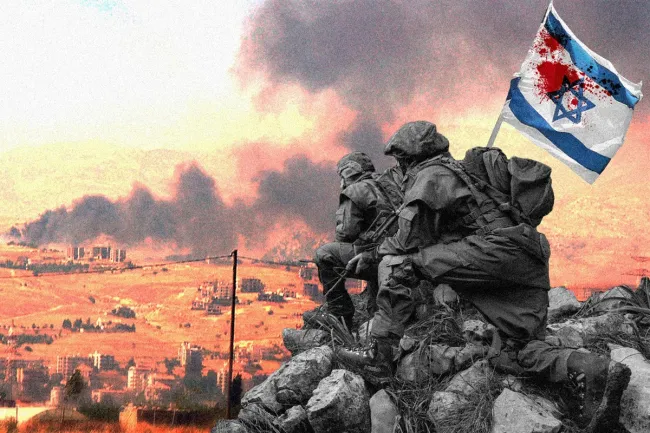Israel Invades Lebanon 2024 News: A 'Limited' Operation Unleashes Dangerous New Escalation in Hezbollah-Israel Conflict
In a dramatic and potentially explosive turn of events, Israel has launched a military invasion of Lebanon, describing it as a "limited" operation.
However, the scale and intensity of the assault are already sending shockwaves through the region, raising fears that this could spiral into a larger, regional war. Following days of relentless bombing campaigns on Hezbollah strongholds in Beirut’s suburbs, the Israeli military deployed approximately 10,000 troops to the Lebanese border. Civilians in more than two dozen villages were told to evacuate as the situation deteriorates rapidly.
Israel’s invasion marks a dangerous escalation in its decades-long conflict with Hezbollah, an Iranian-backed militant group and political faction entrenched in Lebanese society. This latest surge of violence follows the dramatic assassination of Hezbollah’s reclusive leader, Hassan Nasrallah, in an airstrike that struck a Beirut suburb. Nasrallah’s death has sent shockwaves through the organization, but Hezbollah has vowed to resist Israeli aggression. Israeli Defense Minister Yoav Gallant warned that this is only the beginning, with plans for an even deeper offensive into Lebanon to neutralize Hezbollah's military capabilities.
The human toll in Lebanon is already devastating, with Lebanese officials reporting over 1,000 civilians killed and more than one million displaced as Israeli airstrikes continue to rain down. Entire villages in southern Lebanon have been leveled, and humanitarian groups warn of an impending crisis as hospitals and emergency services are overwhelmed. Hezbollah, meanwhile, has responded with missile barrages that have wounded Israeli civilians and caused chaos in northern Israel.
This once-limited conflict has escalated beyond the immediate borders of Israel and Lebanon, dragging Iran further into the fray. Tehran, a staunch Hezbollah ally, responded to Israeli strikes by launching at least 180 missiles toward Israel. While most were intercepted by Israel’s Iron Dome and U.S.-supplied defense systems, Iranian officials issued stark warnings of “crushing responses” if Israeli attacks persist. Iranian President Ebrahim Raisi stated that any further "acts of malevolence" by Israel would result in a forceful retaliation that could redraw the lines of conflict in the Middle East.
With both sides locked in this deadly tit-for-tat, regional and global powers are scrambling to contain the situation. The United States, while publicly urging Israel to de-escalate, has privately expressed its continued support for Israel’s military objectives. U.S. forces in the region are reportedly on high alert, with the Biden administration reportedly abandoning diplomatic efforts to broker peace between Hezbollah and Israel, signaling a grim outlook for the future of the conflict. Iran’s growing role, combined with Hezbollah’s missile capabilities, is forcing the international community to weigh the possibility of a multi-front war that could destabilize the entire region.
France and Russia have called for an immediate ceasefire, warning that the conflict risks engulfing neighboring countries, including Syria and Iraq. But Israel appears undeterred. Prime Minister Benjamin Netanyahu, emboldened by recent military successes, has made it clear that the destruction of Hezbollah is a strategic priority. "The regime in Tehran has misjudged our resolve," Netanyahu said in a meeting with military officials, adding that any future attacks on Israeli territory would be met with “unprecedented force.”
The roots of this conflict stretch back decades. Hezbollah, formed in response to Israel’s 1982 invasion of Lebanon, has long been a thorn in Israel’s side, with both parties engaged in periodic skirmishes. But following the October 7 attacks by Hamas on Israel in 2023, Hezbollah significantly ramped up its involvement, launching missile strikes into northern Israel. What was once a low-level conflict confined to Israel's northern border has now escalated dramatically.
Many fear this could be the opening act in a broader Middle East conflict, with Hezbollah’s vast arsenal of missiles—estimated to number over 120,000—posing a serious threat to Israeli civilians and infrastructure. While Israel has reportedly destroyed many of Hezbollah's missile launch sites, military analysts warn that the group retains significant firepower, including precision-guided rockets capable of reaching major Israeli cities like Haifa and Tel Aviv.
The international community’s attempts to broker peace have largely failed. A proposed ceasefire between Israel and Hezbollah, led by France and the United States, collapsed before it could gain traction. As Israel deepens its operations in Lebanon and Hezbollah refuses to back down, the likelihood of a negotiated settlement appears more distant than ever.
The stakes have never been higher. A full-scale ground invasion of Lebanon could trigger mass resistance from both Hezbollah and the Lebanese population, many of whom oppose another Israeli occupation. Meanwhile, Hezbollah’s leadership has warned that they will retaliate with even greater force if Israel continues its offensive. In a chilling speech on Hezbollah’s Al-Manar television network, the group's second-in-command, Naim Qassem, declared that Hezbollah is prepared for a prolonged ground war with Israeli forces. “We will face any possibility, and the resistance forces are ready for a ground engagement,” Qassem said, hinting at further escalation.
As Israel presses forward, what was initially framed as a "limited" mission could easily become a full-blown regional catastrophe. With Iran now more deeply involved, and Hezbollah determined to defend its position, the entire Middle East is on the brink of a war that could drag in neighboring countries and global powers alike.
The unfolding crisis has left the world on edge. How far Israel is willing to push, and how fiercely Hezbollah and Iran will retaliate, could determine whether this conflict remains a localized war or ignites a broader conflagration that plunges the region into unprecedented chaos.
